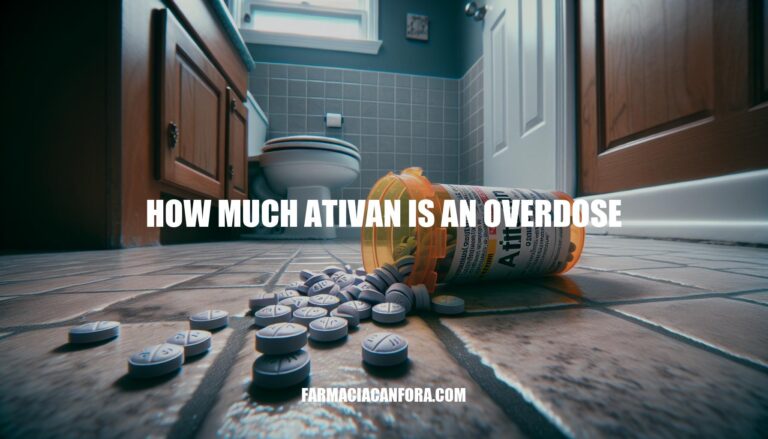


Have you ever wondered about the potential risks of an Ativan overdose? Understanding how much Ativan is considered an overdose is crucial for anyone using this medication for anxiety or insomnia. In this article, we explore the dosage ranges for Ativan, symptoms of an overdose, immediate actions to take in case of an overdose, medical interventions used to treat an overdose, treatment options for Ativan addiction, and tips for preventing accidental overdosing.
Let’s delve deeper into this important topic to ensure your safety and well-being.
The typical dosage range prescribed by healthcare professionals for Ativan varies depending on the condition being treated and individual patient factors such as age, weight, and overall health.
For anxiety disorders, the usual adult dose is:
Older or debilitated patients may require a lower initial dose of 1 to 2 mg orally per day, given in divided doses.
For insomnia, the usual adult dose is:
In pediatric patients (12 years or older), the usual dosage range for anxiety disorders is:
For pediatric patients with insomnia, the usual dosage range is:
It’s essential to note that these are general guidelines and may need to be adjusted based on individual patient factors. Healthcare professionals will typically start with a low dose and gradually increase as needed while monitoring for adverse effects.
It’s essential to seek immediate medical help if you observe any of these symptoms. Ativan overdose can be treated effectively with proper medical care, but delayed treatment can lead to serious complications or even death. Don’t hesitate to call emergency services or take the person to the hospital if you suspect an Ativan overdose.
If you suspect someone has overdosed on Ativan or any other benzodiazepine, it is crucial to act quickly and seek immediate medical attention.
Contact emergency services or a poison control center by calling 911 or the national Poison Help hotline at 1-800-222-1222. Do not attempt to drive the person to the hospital yourself, as this can put both you and the person at risk.
Treatment for an Ativan overdose typically involves supportive care from medical professionals, which may include:
If you or someone you care about is struggling with Ativan addiction, there are various treatment options available. These may include:
Remember, seeking help for Ativan addiction is the first step towards recovery. With the right support and treatment, it is possible to overcome addiction and live a healthy, fulfilling life.
Ativan, also known as lorazepam, is a prescription medication used to treat anxiety disorders and insomnia. However, it can be habit-forming and should only be taken as directed by a doctor.
Long-term effects of an Ativan overdose can include cognitive deficits such as memory impairment and decreased mental clarity. Physical effects may manifest as chronic weakness or fatigue, and in some cases, individuals may suffer from persistent tremors or muscle weakness.
Immediate medical attention is crucial in the event of an Ativan overdose. Medical staff prioritize maintaining the patient’s airway, breathing, and circulation, potentially inserting a breathing tube if necessary. Once stabilized, individuals often transition to recovery programs that provide continued care and support.
Treatment typically includes detoxification, therapy, and support groups, which address both the physical and psychological aspects of addiction.
To prevent accidental overdosing on Ativan, follow these measures:
Remember, it is essential to use Ativan only as directed by your doctor. If you are concerned about the potential for overdosing on Ativan, talk to your doctor about alternative treatment options that may be safer for you.
In conclusion, knowing how much Ativan is an overdose is essential for those who rely on this medication. Symptoms of an overdose can range from confusion and extreme drowsiness to respiratory depression and loss of consciousness. Immediate medical attention is crucial in such cases, with treatment options including breathing support, overdose antidotes, and monitoring of vital signs.
Preventing accidental overdosing involves secure storage, following dosage instructions, and avoiding interactions with alcohol or other substances. Remember, using Ativan responsibly and seeking help if needed are key steps toward maintaining your health and safety. Stay informed, stay safe.